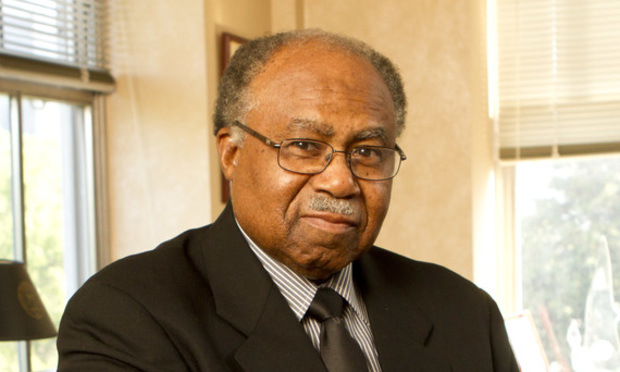Ga. High Court Reloads Gunshot Victim's Suit Against Medical Supply Company
Overturning two lower courts, the justices ruled Georgia's Business Security and Employee Privacy Act does not protect a company whose employee carries a gun in a company-owned vehicle onto someone else's property.
March 05, 2018 at 04:39 PM
5 minute read

Overruling the trial court and Court of Appeals, the Georgia Supreme Court has revived a lawsuit filed by a laboratory technician against a company whose employee accidentally shot him after bringing a loaded handgun into the lab on a service call.
The unanimous decision said both lower courts misconstrued a Georgia law allowing employees to bring guns to their workplace as long as the weapons are locked in their private vehicles, noting that—in the case at hand—the pistol-packing service rep was in a company-owned vehicle on a client's property.
The Business Security and Employee Privacy Act does immunize an employer “arising out of the transportation, storage, possession or use of a firearm” by an employee, wrote Justice Robert Benham.
But, he wrote, the lower courts failed to observe a key phrase of the statute: “pursuant to this code section.”
The 2008 statute—dubbed the “Bring Your Guns to Work Act” by critics—expressly applies to privately-owned vehicles parked on company property.
“This incident did not even occur on the employer's premises,” wrote Benham, “but on the premises of the employer's customer. … No support exists for the proposition that the code section's purpose was to immunize employers from all firearm-related tort liability.”
As detailed in the complaint and other filings, the incident happened in 2013 when Jeremy Wilson, then a field service engineer for medical supply company Beckman Coulter, was on a maintenance call to Albany Area Primary Healthcare.
Lab tech Claude Lucas, then 59, was outside and greeted Wilson, whom he knew from previous visits. As they were about to re-enter the building, Lucas noted there had been several recent car break-ins in the parking lot.
Wilson, worried that his .40 caliber handgun might be stolen, retrieved the weapon, and the two went inside. He was attempting to clear the gun by ejecting a chambered round when it discharged, hitting Lucas in the abdomen.
Lucas underwent surgery and accrued more than $100,000 in medical bills.
Wilson was not charged but was fired two days later for violating company policy by having a handgun in a company vehicle.
Lucas sued Wilson and Beckman Coulter in Fulton County State Court, accusing Wilson of negligence and Beckman Coulter of negligent supervision and respondeat superior.
In 2015, State Court Judge Jay Roth dismissed the claims against Beckman Coulter by ruling, among other things, that the statute shielded the company from liability.
In 2016, the Georgia Court of Appeals agreed, ruling there was nothing in the law “limiting the scope of employer immunity to incidents involving employee-owned vehicles, nor is there a separate subsection of the statute expressly providing a limitation or exception” to that immunity.
In appealing to the high court, Lucas' attorney, Dustin Brown of Columbus' Daughtery, Crawford & Brown zeroed in on the same language as Benham's opinion, telling the Daily Report at the time that the law “provides related immunity to employers for occurrences arising out of use of a firearm 'pursuant to this code section,' which by its plain language is limited to privately-owned vehicles of employees or invited guests.”
In Benham's opinion, interpreting the statute without that caveat renders the phrase “mere surplusage.”
“Although the Court of Appeals recites the rule that courts must seek to avoid a construction that makes some language a statute mere surplusage, it goes on to do just that,” Benham wrote.
In a footnote, Benham was careful to point out that the ruling “is not to say that [Beckman Coulter] is necessarily liable to Lucas, but only that the statute does not provide immunity in this case.”
Justice Nels Peterson was disqualified from ruling in the case, and was replaced by Gwinnett Superior Court Judge Kathryn Schrader.
Brown, said he was pleased with the ruling, which he described as “critically important not only to my client's claims but also to preserving the legal rights of other Georgia citizens who suffer firearm-related injuries.”
Wilson, he confirmed, is still a co-defendant in the case.
There was no immediate response from Beckman Coulter's attorneys, Hunton & Williams partners Kurt Powell and Robert Dumbacher, or from Wilson's lawyer, Clayton Adams of Columbus' Brown & Adams.
This content has been archived. It is available through our partners, LexisNexis® and Bloomberg Law.
To view this content, please continue to their sites.
Not a Lexis Subscriber?
Subscribe Now
Not a Bloomberg Law Subscriber?
Subscribe Now
NOT FOR REPRINT
© 2025 ALM Global, LLC, All Rights Reserved. Request academic re-use from www.copyright.com. All other uses, submit a request to [email protected]. For more information visit Asset & Logo Licensing.
You Might Like
View All
Georgia Justices Urged to Revive Malpractice Suit Against Retired Barnes & Thornburg Atty
4 minute read
Medical Student's Error Takes Center Stage in High Court 'Agency' Dispute
7 minute read
Trending Stories
- 1States Accuse Trump of Thwarting Court's Funding Restoration Order
- 2Microsoft Becomes Latest Tech Company to Face Claims of Stealing Marketing Commissions From Influencers
- 3Coral Gables Attorney Busted for Stalking Lawyer
- 4Trump's DOJ Delays Releasing Jan. 6 FBI Agents List Under Consent Order
- 5Securities Report Says That 2024 Settlements Passed a Total of $5.2B
Who Got The Work
J. Brugh Lower of Gibbons has entered an appearance for industrial equipment supplier Devco Corporation in a pending trademark infringement lawsuit. The suit, accusing the defendant of selling knock-off Graco products, was filed Dec. 18 in New Jersey District Court by Rivkin Radler on behalf of Graco Inc. and Graco Minnesota. The case, assigned to U.S. District Judge Zahid N. Quraishi, is 3:24-cv-11294, Graco Inc. et al v. Devco Corporation.
Who Got The Work
Rebecca Maller-Stein and Kent A. Yalowitz of Arnold & Porter Kaye Scholer have entered their appearances for Hanaco Venture Capital and its executives, Lior Prosor and David Frankel, in a pending securities lawsuit. The action, filed on Dec. 24 in New York Southern District Court by Zell, Aron & Co. on behalf of Goldeneye Advisors, accuses the defendants of negligently and fraudulently managing the plaintiff's $1 million investment. The case, assigned to U.S. District Judge Vernon S. Broderick, is 1:24-cv-09918, Goldeneye Advisors, LLC v. Hanaco Venture Capital, Ltd. et al.
Who Got The Work
Attorneys from A&O Shearman has stepped in as defense counsel for Toronto-Dominion Bank and other defendants in a pending securities class action. The suit, filed Dec. 11 in New York Southern District Court by Bleichmar Fonti & Auld, accuses the defendants of concealing the bank's 'pervasive' deficiencies in regards to its compliance with the Bank Secrecy Act and the quality of its anti-money laundering controls. The case, assigned to U.S. District Judge Arun Subramanian, is 1:24-cv-09445, Gonzalez v. The Toronto-Dominion Bank et al.
Who Got The Work
Crown Castle International, a Pennsylvania company providing shared communications infrastructure, has turned to Luke D. Wolf of Gordon Rees Scully Mansukhani to fend off a pending breach-of-contract lawsuit. The court action, filed Nov. 25 in Michigan Eastern District Court by Hooper Hathaway PC on behalf of The Town Residences LLC, accuses Crown Castle of failing to transfer approximately $30,000 in utility payments from T-Mobile in breach of a roof-top lease and assignment agreement. The case, assigned to U.S. District Judge Susan K. Declercq, is 2:24-cv-13131, The Town Residences LLC v. T-Mobile US, Inc. et al.
Who Got The Work
Wilfred P. Coronato and Daniel M. Schwartz of McCarter & English have stepped in as defense counsel to Electrolux Home Products Inc. in a pending product liability lawsuit. The court action, filed Nov. 26 in New York Eastern District Court by Poulos Lopiccolo PC and Nagel Rice LLP on behalf of David Stern, alleges that the defendant's refrigerators’ drawers and shelving repeatedly break and fall apart within months after purchase. The case, assigned to U.S. District Judge Joan M. Azrack, is 2:24-cv-08204, Stern v. Electrolux Home Products, Inc.
Featured Firms
Law Offices of Gary Martin Hays & Associates, P.C.
(470) 294-1674
Law Offices of Mark E. Salomone
(857) 444-6468
Smith & Hassler
(713) 739-1250







